We often hear about two sides of pregnancy: intense cravings, and phases where even the thought of food makes you want to be sick. If you fall into the latter group, mealtime can be especially tricky.
For one woman dealing with food sensitivities, things became even more complicated when her mother-in-law invited them for Thanksgiving. She explained how her MIL often uses questionable ingredients and expressed concern for her own health. Keep reading to see how this tense situation unfolded.
Every pregnancy is unique, with its own challenges and experiences

Image credits: wavebreakmedia_micro (not the actual photo)
A woman shared her struggles with food sensitivities during pregnancy and her fear of eating her mother-in-law’s questionable food
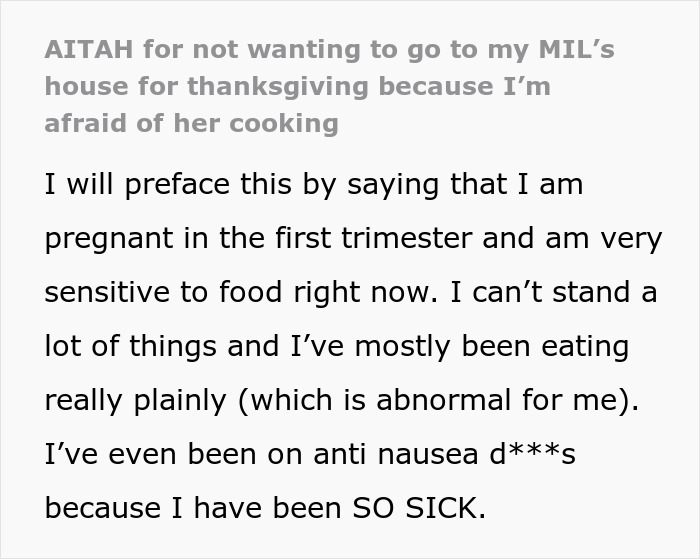

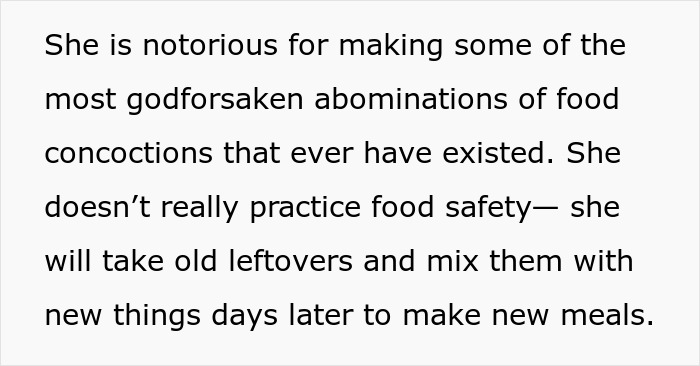

Image credits: gpointstudio (not the actual photo)





Image credits: freepik (not the actual photo)



Image credits: BluejayRelevant2005
The author further discussed her health concerns and how her husband responded to the situation
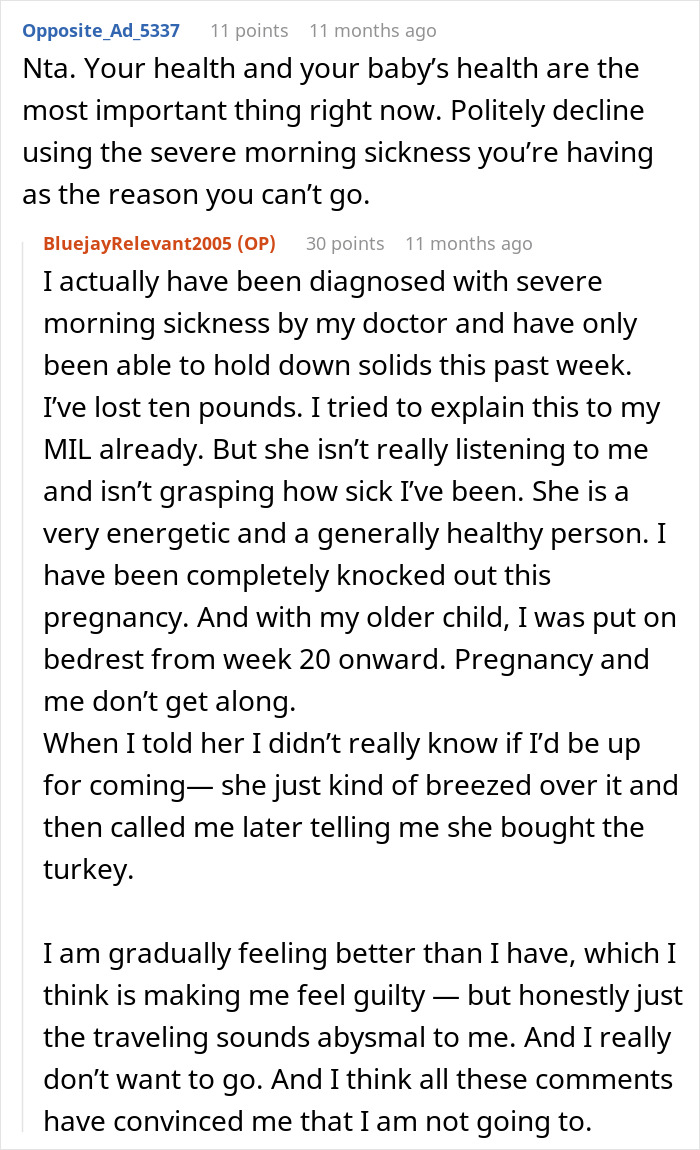
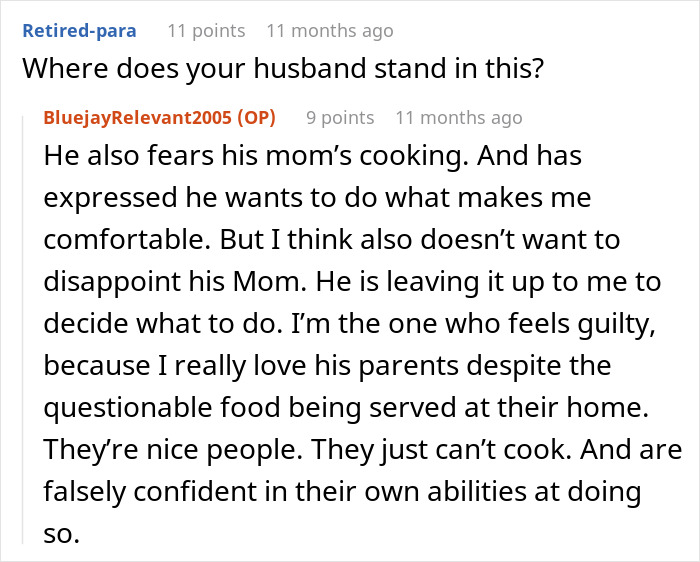

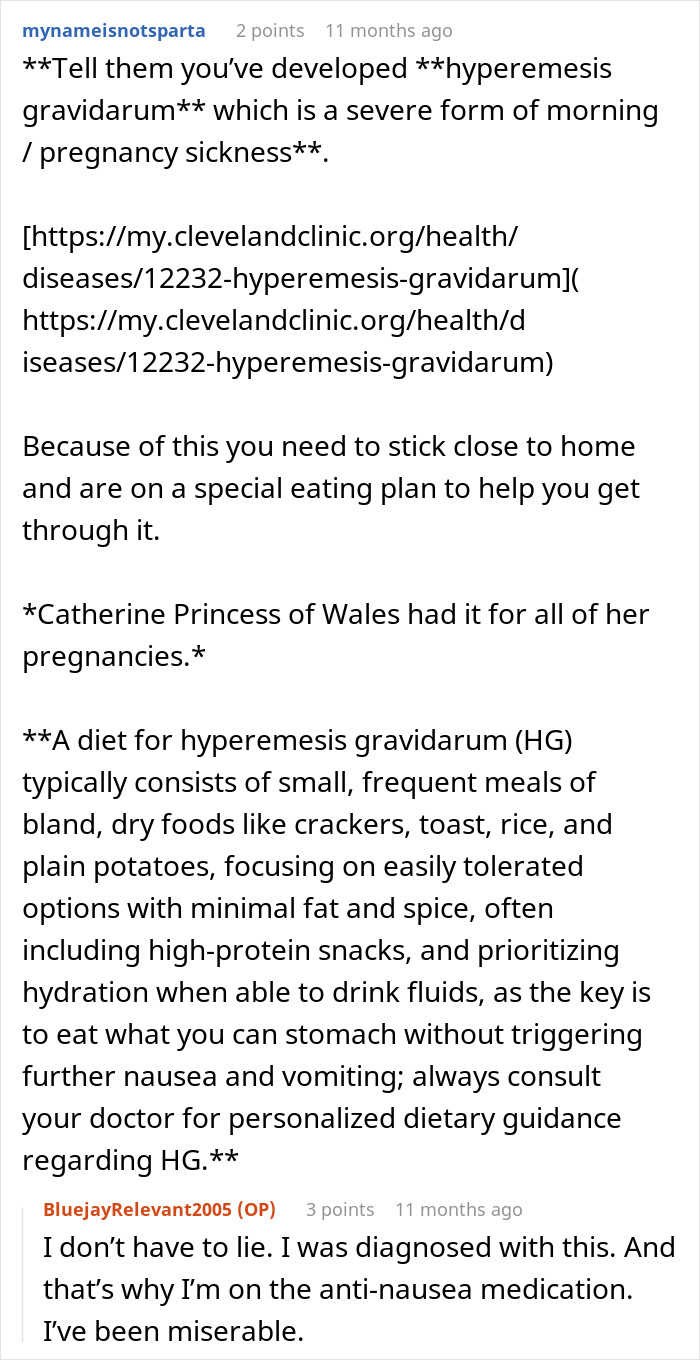

Pregnant women often become extra sensitive to strong smells and intense flavors
Food aversions are incredibly common while pregnant. What you loved in one trimester could be your nemesis in the next. Some pregnancies bring completely different preferences than others, and nausea isn’t limited to the morning, it can strike any time. That ham pizza you once craved? Suddenly, it makes you want to run to the nearest trash can. And somehow, pickles with mustard start sounding like the most tempting snack in the world.
Basically, food during pregnancy is unpredictable: sometimes weird, often confusing, and always worth a story. Research shows that most pregnant women experience nausea or food aversions at some point, and they can actually serve as a protective mechanism to avoid foods that might be harmful.
Hormones are the sneaky culprits behind many of these sudden food aversions. The hormone human chorionic gonadotropin, or hCG, is doing a lot of heavy lifting early in pregnancy. It can affect how you taste and smell everything, turning previously appetizing foods into stomach-churning horrors. One whiff of something too strong, and you might feel your body protesting in ways you didn’t expect. Progesterone also plays a role by slowing digestion and increasing sensitivity to smells.
It’s not just about hating your favorite foods, some people develop a distaste for bitter, spicy, or pungent flavors. And that’s okay. You don’t need to eat more than usual; focus on variety instead. Mix it up with safe, tolerable foods to get your nutrients.
It’s important for pregnant women to maintain a balanced diet, ensuring they get all essential nutrients for both themselves and the baby
The goal is simple: keep things balanced without forcing yourself to choke down something your body truly doesn’t want. Fruits, vegetables, whole grains, lean protein, and healthy fats are still your best friends. Think rainbow plates and colorful meals, they make your body happy and give you energy. Your little one is growing fast, and feeding both of you well is the ultimate power move.
Staying hydrated is also crucial; aim for at least 8–10 glasses of water a day, and include soups, smoothies, or natural juices if plain water feels unappealing. Prenatal vitamins help fill any nutritional gaps that your aversions might create.
One key tip? Avoid triggers that make your stomach rebel. Strong smells, lingering cooking aromas, and certain combinations can all spark nausea. If something smells like trouble, step away, ventilate, or grab a snack that’s gentler on your senses. Listening to your body during pregnancy isn’t indulgence, it’s survival.
Small, frequent meals are also advisable. Eating a giant plate of food in one sitting can overwhelm your stomach and make nausea worse. Instead, snack throughout the day, balance protein and carbs, and keep hydrated. Think mini meals, not massive feasts, it’s easier on your body and helps you feel more in control. Simple, easy-to-digest snacks like crackers, yogurt, or fruit slices can keep blood sugar steady. Preparing meals ahead of time ensures you always have tolerable options on hand when appetite strikes.
Certain foods are notorious troublemakers: fried, fatty, heavily battered, or super spicy meals can make nausea skyrocket. Pair that with fatigue, and you’ve got a recipe for disaster. Rest when you can, keep your kitchen adventures simple. For instance, opting for baked, steamed, or grilled options can help reduce discomfort. Tracking what consistently triggers your nausea can also help you make better meal choices throughout pregnancy.
Ultimately, pregnancy is all about prioritizing yourself and your baby. Listen to your cravings, avoid foods that make you feel ill, and focus on nutrition and comfort. Some days, it’s smoothie time; other days, it’s cereal for dinner. And that’s okay, your pregnancy journey is uniquely yours, and every weird, wonderful bite is part of the story. Remember, it’s normal to have ups and downs; feeling guilty about food aversions won’t help.
In this particular case, the woman was genuinely worried that her mother-in-law’s questionable cooking could make her sick. She wanted to protect her health and ensure that both she and her baby stayed safe. The situation highlights how challenging it can be to navigate family expectations while prioritizing personal well-being. What are your thoughts on her approach? How would you have handled being in a similar scenario, balancing family dynamics and your own health?
Many people advised her to avoid visiting her in-laws altogether






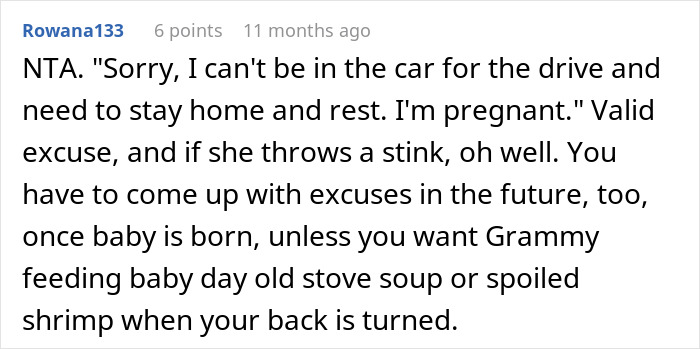



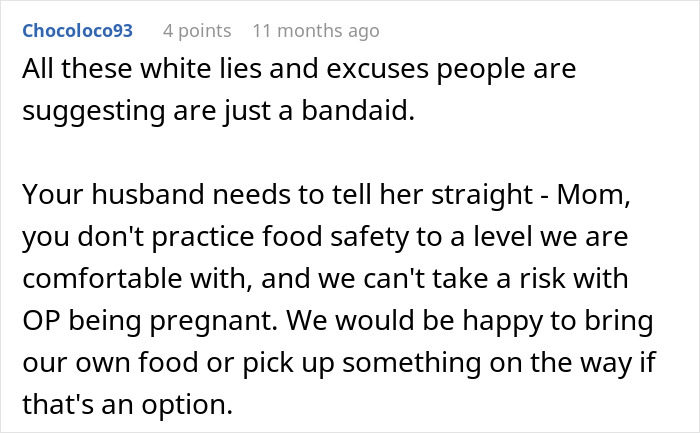

 Follow Us
Follow Us





